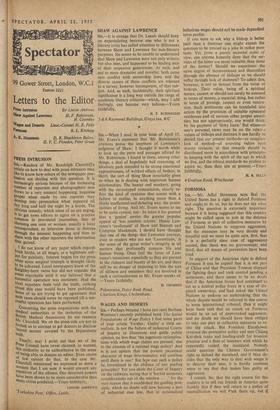WAGES AND DESERTS
SIR,—Perhaps because I have just read Barbara Wootton's recently published book The Social Foundations of Wage Policy 1 find some parts of your article 'Verdict: Guilty' a little un- realistic. Is not the failure of industrial Courts of Inquiry to illuminate and guide public opinion, no less than 'the ingenious rationalisa- tions with which wage claims are pressed,' due to the absence of a rational wage policy? And is it not certain that the present piecemeal character of wage determination will continue until there is one? But how can such a policy be formulated in the absence of any guiding principles? Yet you chide the Court of Inquiry on the railways. saying that it 'hurled economic considerations out of the window . . .' for the very reason that it established the guiding prin- ciple, which no doubt will now become a part of industrial case law, that in nationalised industries wages should not be made dependent upon profits.
If one were to ask why a bishop is better paid than a dustman one might expect the question to be treated as a joke in rather poor taste. Yet, from a purely material point of view, can anyone honestly deny that the ser- vices of the latter are more valuable than those of the former? Should we experience the same degree of inconvenience and discomfort through the absence of bishops as we should suffer through lack of dustmen? To admit this, however, is not to detract from the value of bishops. Their value, being of a spiritual nature, cannot or should not surely be assessed in terms of money,,a material thing, but rather in terms of prestige, respect or even venera- tion. Such sentiments can be translated into action by the provision of suitable episcopal residences and of various other proper ameni- ties; but not appropriately, one would think, by the payment of 'filthy lucre.' But whatever one's personal, views may be on the relatise values of bishops and dustmen it can hardly be denied that our present methods—or compleic lack of method—of assessing values need drastic revision; or that rewards should be distributed more in accordance with principles in keeping with the spirit of the age in which we live, and the ethical standards we profess to aspire to, than they are at present.—Yours faithfully, 4 Graf ton Road, Winchester










































 Previous page
Previous page